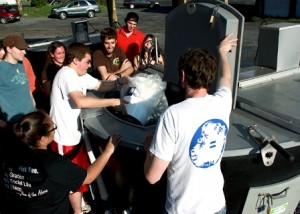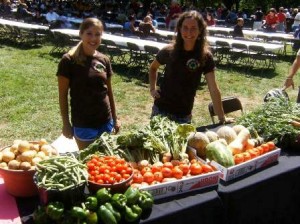
Students load one of the College’s Earth Tub composting units
A team of students and professors presented the College’s food loop project at the seventh annual National Sustainable Design Expo held in conjunction with the Environmental Protection Agency’s (EPA) Earth Day celebration last weekend in Washington, D.C.
Better known as the EPA: People, Prosperity, and the Planet award competition, Lafayette’s team was invited after going through a rigorous selection process. Last semester, the EPA awarded a $10,000 phase I seed grant to help fund the project, which was identified as one “whose innovative technologies are designed to advance economic growth while reducing environmental impact.”

Vegetables from the College’s organic gardens
The project involves composting food waste from Lafayette’s dining halls that is then used to fertilize the crops grown in the College’s community gardens at Metzgar Fields, which in turn are used back in the dining halls. It previously received a $5,000 grant from the Clinton Global Initiative University for the gardens and a $41,000 state grant to purchase Earth Tub composting bins.
The expo presentation, titled “Sustainable College Communities: Incorporating a Sustainable Food Loop,” also discussed the project’s possible expansion to an online educational format which allows real-time data from the College food loop system to be uploaded.
Brian Peacock ’12 (Haddonfield, N.J.), a civil engineering major who serves as the team’s leader, explains how important the online database will be. “Real-time data allows us to analyze the system on a much finer time scale which we believe will let us more easily develop improvements to the system.”
The team also believes that this new online dashboard would increase partnerships with other schools. “Communities will be able to share ideas and problems, so together we can troubleshoot and maximize the efficiency of food loop systems nationwide,” says Rebecca Citrin ’14 (Springfield, N.J.).
The food loop project is run mainly as part of the College’s Society of Environmental Engineers and Scientists and Lafayette Environmental Awareness and Protection. The team’s advisers are Steve Mylon, assistant professor of chemistry, Arthur Kney, associate professor and head of civil & environmental engineering, and John Greenleaf, visiting assistant professor of civil & environmental engineering. It is an interdisciplinary endeavor that requires many skill sets.
“Anyone can get involved, regardless of your major,” says civil engineering major Emily Clark ’12 (Kendall Park, N.J.). “The project needs engineering students as well as students studying art, anthropology/sociology, English, psychology, and economics.”
Citron hopes that the plan for Laf-Ecospace will be put into action soon since it will provide varying levels of information for individuals of all scientific backgrounds. She says, “The development of Ecospace will serve to better the college community as a whole because it will not only serve to educate the members of our institution, but it will also allow students to get more involved in our sustainability initiative.”

